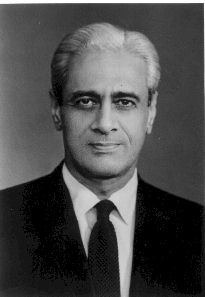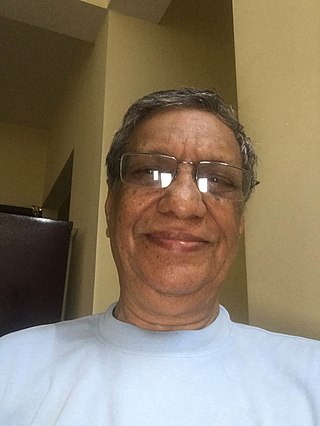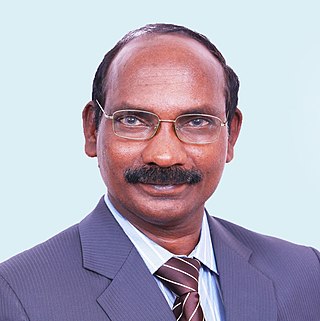The Vikram Sarabhai Space Centre (VSSC) is a major space research centre of the Indian Space Research Organisation (ISRO), focusing on rocket and space vehicles for India's satellite programme. It is located in Thiruvananthapuram, in the Indian state of Kerala.

Satish Dhawan was an Indian mathematician and aerospace engineer, widely regarded as the father of experimental fluid dynamics research in India. Born in Srinagar, Dhawan was educated in India and further on in United States. Dhawan was one of the most eminent researchers in the field of turbulence and boundary layers, leading the successful and indigenous development of the Indian space programme. He succeeded M. G. K. Menon, as the third chairman of the Indian Space Research Organisation (ISRO) in 1972.

Birla Institute of Technology, Ranchi is a public deemed institute in Ranchi, Jharkhand, India. It was established in 1955 at Mesra, Ranchi, by the industrialist B. M. Birla. The institute was later headed by G. P. Birla, and the present chairman of the board of governors is C. K. Birla. It was declared as a deemed university under Section 3 of the UGC Act.

G. Madhavan Nair is an Indian space scientist and a former Chairman of the Indian Space Research Organisation, and Secretary to the Department of Space, Government of India. He has also been the Chairman of the Space Commission and Chairman of the Governing Body of the Antrix Corporation, Bangalore. He was Chairman of the Board of Governors of the Indian Institute of Technology Patna until he stepped down due to his involvement in a controversial deal relating to sale of radio spectrum bandwidth involving Antrix. He was subsequently barred from holding any government positions.

Indian Institute of Space Science and Technology (IIST) is a government-aided institute and deemed university for the study and research of space science, located at Valiamala, Nedumangad, Thiruvananthapuram, Kerala. It is the first university in Asia to be solely dedicated to the study and research of Outer space. It was inaugurated on 14 September 2007 by G. Madhavan Nair, the then Chairman of ISRO. IIST was set up by the Indian Space Research Organisation (ISRO) under the Department of Space, Government of India. A. P. J. Abdul Kalam, former President of India, was the Chancellor of IIST. IIST offers regular engineering undergraduate, postgraduate and doctorate programmes with focus on space science, technology and applications.
Byrana Nagappa Suresh is an Indian aerospace scientist. He is presently the Chancellor, Indian Institute of Space Science and Technology (IIST) at Thiruvananthapuram and Honorary Distinguished Professor at ISRO HQ. He was President Indian National Academy of Engineering, INAE at Delhi, for four years during 2015 to 2018. He served as the Director of Vikram Sarabhai Space Centre (VSSC), Thiruvananthapuram during the period 2003–2007. He is known for his contribution to the development of Indian launch vehicles, Space Capsule Recovery Experiments (SRE) and also for R& D management. Suresh also served as the founding director of Indian Institute of Space Science and Technology (IIST), Thiruvananthapuram. He retired from IIST in November 2010. He was Vikram Sarabhai Distinguished Professor at ISRO HQ for 5 years since November 2010 and also a professor at IIT, Mumbai and MIT, Manipal for 3 years. He was a member of the board of governors (BOG) for IIT, Madras for 7 years until July 2018. He is the vice chair for the Design Division of Aeronautical Society of India. He is one of the associate editors of the book From Fishing Hamlet To Red Planet and a co-author of Ever Upwards: ISRO in Images, both tracing the history of Indian Space Research Organisation. He is the President of the reputed Jnanadeepa Senior Secondary School and Sri Aurobindo Foundation for Education

Gaganyaan is an Indian crewed orbital spacecraft intended to be the formative spacecraft of the Indian Human Spaceflight Programme. The spacecraft is being designed to carry three people, and a planned upgraded version will be equipped with rendezvous and docking capability. In its maiden crewed mission, Indian Space Research Organisation (ISRO)'s largely autonomous 5.3 metric tonnes capsule will orbit the Earth at 400 km altitude for up to seven days with a two or three-person crew on board. The first crewed mission was originally planned to be launched on ISRO's LVM3 in December 2021, but this has since been delayed to no earlier than 2025.

Koppillil Radhakrishnan is an Indian space scientist who headed the Indian Space Research Organisation (ISRO) between November 2009 and December 2014 as Chairman of Space Commission, Secretary of the Department of Space and Chairman of ISRO. Prior to this, he was the Director of Vikram Sarabhai Space Centre (2007-2009) and Director of National Remote Sensing Agency (2005-2008) of the Department of Space. He had a brief stint of five years (2000-2005) in the Ministry of Earth Sciences as Director of Indian National Centre for Ocean Information Services (INCOIS).

Prem Chand Pandey is an Indian space scientist, planetary scientist, and academic in the fields of satellite oceanography, remote sensing, atmospheric science, the Antarctic and climate change, and also he is the founding director of the National Centre for Polar and Ocean Research (NCPOR).
Parivakkam Subramaniam Veeraraghavan is a well known space scientist and rocket technologist of India. He has served as the Director of Vikram Sarabhai Space Centre (VSSC), Thiruvananthapuram, Kerala and as the Director of ISRO Inertial Systems Unit (IISU), Thiruvananthapuram. One of the most senior scientists at Indian Space Research Organization (ISRO), Veeraraghavan is known for his contributions to launch vehicle technology, especially in the areas of integration & checkout and Inertial Systems of ISROs launch vehicles. Presently, he is holding the honorary position of Prof. Vikram Sarabhai Distinguished Professor in VSSC, ISRO since January 2013.

S. Nambi Narayanan is an Indian aerospace scientist who worked for the Indian Space Research Organisation (ISRO) and contributed significantly to the Indian space program by developing the Vikas rocket engine. He led the team which acquired technology from the French for the Vikas engine used in the first Polar Satellite Launch Vehicle (PSLV) that India launched. As a senior official at the ISRO, he was in charge of the cryogenics division. He was awarded the Padma Bhushan, India's third-highest civilian award, in March 2019.
Haridwar Singh was an Indian scientist. He has been director of the High Energy Materials Research Laboratory (HEMRL), Defence Research and Development Organisation (DRDO), Ministry of Defence, from 1990 to 2004.

B. M. Birla Planetarium is a large planetarium in Chennai, India. The fifth B. M. Birla planetarium in the country, it is located at Kotturpuram in the Periyar Science and Technology Centre campus which houses eight galleries, namely, Physical Science, Electronics and Communication, Energy, Life Science, Innovation, Transport, International Dolls and Children and Materials Science, with over 500 exhibits. Built in 1988 in the memory of the great industrialist and visionary of India B. M. Birla, it is considered the most modern planetarium in India, providing a virtual tour of the night sky and holding cosmic shows on a specially perforated hemispherical aluminium inner dome. Other Birla planetariums in India include the M. P. Birla Planetarium in Kolkata, the Birla Planetarium in Hyderabad, and the planetariums in Tiruchirapalli and Coimbatore.
Chandrathil Gouri Krishnadas Nair is an Indian technocrat, teacher and metallurgical scientist known for his contributions in the field of aeronautical metallurgy. Dr Nair was given the Padma Shri Award by the Government of India for his contributions to science and technology in 2001.

M. C. Dathan is an Indian space scientist and former director of the Vikram Sarabhai Space Centre (VSSC). The Government of India honoured him, in 2014, by awarding him the Padma Shri, the fourth highest civilian award, for his contributions to the fields of science and technology. In May 2016, the Government of Kerala appointed MC Dathan as the scientific advisor to chief minister.
Prahlada is an Indian missile scientist, former vice chancellor of Defence Institute of Advanced Technology and a former director of Defence Research and Development Laboratory, the largest of the Defence Research and Development Organization laboratories in India, known for his contributions to Indian space programme. He was honoured by the Government of India in 2015 with Padma Shri, the fourth highest Indian civilian award.

Kailasavadivoo Sivan is an Indian space scientist who served as the Secretary of the Department of Space and chairman of Indian Space Research Organisation and Space Commission. He has previously served as the Director of the Vikram Sarabhai Space Center and the Liquid Propulsion Systems Centre.
Suryanarayanan Srinivasan (1941–1999) was an Indian aeronautical engineer and the Director of the Vikram Sarabhai Space Centre (VSSC), known for his pioneering work in rocket science. He also served as the director of Satish Dhawan Space Centre and assisted A. P. J. Abdul Kalam in the SLV3 Mission as its deputy director. He was an elected Fellow of the Aeronautical Society of India and the Indian National Academy of Engineering. The Government of India awarded him the third highest civilian honour of the Padma Bhushan, in 2000, for his contributions to Indian space program.
Kuppuswamy Anantha Padmanabhan is an Indian academician well known for his contributions in the field of materials & metallurgical science and engineering. In particular, he is well renowned for his contributions to superplasticity. He is currently professor of eminence (honorary), Anna University, Chennai; member, Research and Innovation Advisory Board, TCS and a research advisor to TCS and Aditya Birla S&T Company. He is a former director of Indian Institute of Technology Kanpur and a former dean, academic research, IIT Madras, India. In 1994, he became the first Indian to receive the "Forschungspreis" of the Alexander von Humboldt Foundation, Germany. For his research contributions, the University of Cambridge, UK, conferred on him the highest academic degree ‘Sc.D’ in 1998, and he is the first Indian engineer/ materials specialist to be conferred this honour. He also served as the Mercator Professor of DFG at the Institute of Materials Physics, University of Münster, Germany.

Sreedhara Panicker Somanath is an Indian aerospace engineer serving as the chairman of the Indian Space Research Organisation.










